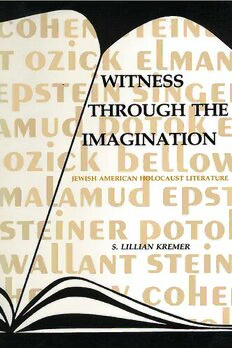
Witness Through the Imagination: Jewish American Holocaust Literature PDF
Preview Witness Through the Imagination: Jewish American Holocaust Literature
WITNESS THROUGH THE IMAGINATION OZICK ELMAN COHEN POTOK SINGER EPSTEIN BELLOW STEINER WALLANT MALAMUD WITNESS THROUGH THE IMAGINATION JEWISH AMERICAN HOLOCAUST LITERATURE S. LILLIAN KREMER ..,_. WAYNE STATE UNIVERSITY PRESS DETROIT 1989 Copyright © 1989 by Wayne State University Press, Detroit, Michigan 48202. All material in this work, except as identified below, is licensed under a Creative Commons Attribution-NonCommercial 3.0 United States License. To view a copy of this license, visit https://creativecommons.org/licenses/by-nc/3.0/us/. All material not licensed under a Creative Commons license is all rights reserved. Permission must be obtained from the copyright owner to use this material. Library of Congress Cataloging-in-Publication Data Kremer, S. Lillian, 1939– Witness through the imagination : Jewish-American holocaust literature / S. Lillian Kremer. p. cm. Includes index. ISBN 978-0-8143-4393-7 (Paperback).—ISBN 978-0-8143-4394-4 (ebook) PS374.H56K7 1989 813’.54’09358—dc19 88–34652 CIP The publication of this volume in a freely accessible digital format has been made possible by a major grant from the National Endowment for the Humanities and the Mellon Foundation through their Humanities Open Book Program. Acknowledgments Portions of this book previously appeared in somewhat altered form in the Holocaust Studies Annual and the Saul Bellow Journal. Portions of Chapter 7 previously appeared in somewhat altered form in Studies in American Jewish Literature 6 (Fall 1986), “The World of Cynthia Ozick,” Daniel Walden, ed., pp. 24–43. Quotations from The Victim by Saul Bellow reprinted by permission of the publisher, Vanguard Press, Inc. Copyright © 1947 by Saul Bellow. Renewed copyright © 1974 by Saul Bellow. Excerpts from The Pawnbroker, copyright © 1961 by Edward Lewis Wallant, reprinted by permission of Harcourt Brace Jovanovich, Inc. Selections from The Portage to San Cristobal of AH copyright © 1979, 1981 by George Steiner. Reprinted by permission of Simon & Schuster, Inc., and Faber and Faber Ltd. The author gratefully acknowledges permission from Richard Elman, Leslie Epstein, and Cynthia Ozick to reprint excerpts from their works. Wayne State University Press thanks the Penkevill Publishing Company, Penn State University Press, and the Saul Bellow Journal for their generous permission to reprint material in this book. Exhaustive efforts were made to obtain permission for use of material in this text. Any missed permissions resulted from a lack of information about the material, copyright holder, or both. If you are a copyright holder of such material, please contact WSUP at [email protected]. http://wsupress.wayne.edu/ This book is dedicated to my father, Joseph Kimmel, whose reports of pre-Shoah Jewish life in Poland and whose Holocaust losses sensitized me to the treach eries of anti-Semitism; to my sons, Michael and Ian, who have unselfishly used their energies to support threatened people; to survivors who have endured and taught us much; and to the blessed memory of the six million Jews who perished. For the Jewish novelist of today, assuming he does not repudiate his Jewishness, there can be no theme more urgent and meaningful than that of the suffer ing of his people in the Nazi era. All plots and para bles pale and sound trivial by comparison: his is the awesome privilege to identify with a tale, unique in its shattering power. Elie Wiesel CONTENTS Preface 7 Acknowledgments 12 Introduction 13 Chapter One Scars of Outrage: The Holocaust in The Victim and Mr. Sammler's Planet 36 Chapter Two From Buchenwald to Harlem: The Holocaust Universe of The Pawnbroker 63 Chapter Three Seekers and Survivors: The Holocaust-Haunted Fiction of Bernard Malamud 81 5 6 Contents Chapter Four Chaim Rumkowski and the Lodz Ghetto in Leslie Epstein's King of the]e ws 103 Chapter Five The Trial of the Damned: Richard Elman's Holocaust Trilogy 142 Chapter Six Kaddish and Resurrection: Isaac Bashevis Singer's Holocaust Memorial 181 Chapter Seven The Dybbuk of All the Lost Dead: Cynthia Ozick's Holocaust Fiction 218 Chapter Eight Eternal Faith, Eternal People: The Holocaust and Redemption in Arthur A. Cohen's In the Days of Simon Stern 279 Chapter Nine Eternal Light: The Holocaust and the Revival of Judaism and Jewish Civilization in the Fiction of Chaim Potok 300 Chapter Ten Nazism on Trial: The Holocaust Fiction of George Steiner 324 Conclusion 356 Notes 364 Index 385 PREFACE During the twentieth century, humanity has exhibited unparalleled creative and destructive capacities. Ger many-celebrated for its cultural and scientific achievements-em braced a political system and supported a technological program designed to annihilate an entire people singled out by racial crite ria. The Germans and their accomplices murdered six million Jews, filling mass graves with the corpses and ashes of tortured, mutilated, starved, shot, and gassed victims. The victims-of all ages, all social, educational, and economic strata, and every political persuasion-were a population whose crime was being descended from a Jewish grandparent. Unlike earlier massacres of ethnic pop ulations, the Nazi endeavor was the first to technologically imple ment the systematic annihilation of an entire people. That the Shoah is a focal point of Jewish history is self-evident. The Holo caust should be recognized as a turning point in world history, a catastrophe that altered fundamental assumptions about the human condition. Pre-Auschwitz innocence has been forever oblit erated. We no longer harbor the beliefs about God, civilization, and 7
